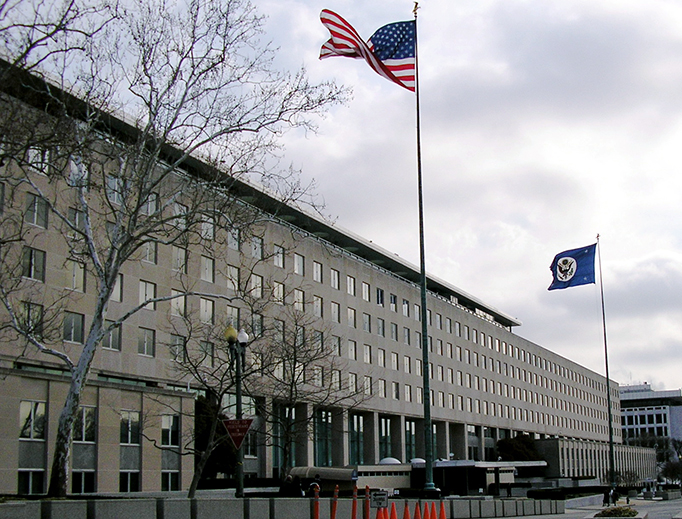U.S. Charts New Strategy for International Religious Freedom
State Department Report Reveals Dramatic Increase in Religious Persecution Around the World

Violence against people of faith is escalating, according to a report released this week by the U.S. Department of State.
In countries around the world, innocent people are being brutalized for their religious beliefs and practices. While Muslim nations in the Middle East are widely considered to be among the most egregious violators of human rights, the State Department's 20th Annual Report on International Religious Freedom cites persecution in nations including (but not limited to) North Korea, Burma, China, Iran, Pakistan, Saudi Arabia, Russia and Nigeria.
Under Sam Brownback, President Trump's Ambassador-at-Large for International Religious Freedom, the United States appears to be charting a new course to address the crisis. This week Ambassador Brownback and Secretary of State Mike Pompeo announced a “Ministerial to Advance Religious Freedom” which will be held in Washington, DC, on July 25-26. The session is the first such high-level gathering to be hosted by the United States since the passage of the International Religious Freedom Act of 1998, which established the State Department's Office of International Religious Freedom.
Secretary Pompeo intends to invite to the session his counterparts from “like-minded governments” along with representatives from international organizations, religious communities and civil society. In his remarks at the State Department on May 29, Pompeo called religious freedom the “most fundamental of human rights” and declared that the U.S. will not stand by as spectators while people are persecuted over faith. He promised reporters that the Ministerial will not be just a discussion group but will “break new ground” in developing a strategy to address the problem of persecution.
The IRF Report assesses the state of religious freedom in 200 countries and territories, exposing incidents of religious repression and persecution in foreign countries. The Report informs the Secretary of State's religious freedom designations of Countries of Particular Concern (CPC countries), and helps to chart a course of action.
Other concerns itemized in this year's report include:
- North Korea – Some 80,000 to 200,000 political prisoners are being held in prison camps, some for religious reasons. Prisoners are held “under horrific conditions” in remote areas.
- China – “Hundreds of thousands” of Falun Gong adherents and Uighur Muslims have been forcibly sent to reeducation centers.
- Eritrea – The government “reportedly killed, arrested, and tortured religious adherents and coerced individuals into renouncing their faith.”
- Russia – Peaceful religious groups including Jehovah's Witnesses are targeted by authorities, who equate them with terrorists.
- Tajikistan – Minors are prohibited from even participating in any religious activities.
- Saudi Arabia – Public practice of any religion other than Islam is prohibited, and there is a “pattern of society prejudice and discrimination” against Shiite Muslims in the predominantly Sunni Muslim nation. Non-Muslims may be imprisoned, lashed and fined for apostasy, blasphemy, and insulting the state's interpretation of Islam.
- Turkmenistan – Individuals who gather for worship without first registering with the government face arrest, detention and harassment.
- Pakistan – At least 50 people were imprisoned on charges of blasphemy last year; of those, 17 were given death sentences.
Ambassador Sam Brownback said that the U.S. Would “welcome engagement with these and any governments on urgently needed reforms.” He acknowledged that in the 20 years since passage of the original Religious Freedom Act, important progress has been made; but he added that “for far too many, the state of religious freedom is dire. We have to work together to accomplish change.”
U.S. Bishops' Initiative on Religious Liberty
Here in the United States, the U.S. Conference of Catholic Bishops observes Religious Freedom Week from June 22, the feast of Sts. Thomas More and John Fisher, through June 29, the Solemnity of Sts. Peter and Paul. This year the theme for Religious Freedom Week is “Serving Others in God's Love.” Catholics across the United States are encouraged to pray and act in support of religious liberty at home and abroad.
Archbishop Joseph E. Kurtz of Louisville, chairman of the USCCB's Committee for Religious Liberty, stated:
Religious freedom allows the space for people of faith to serve others in God's love in ministries like education, adoption and foster care, health care, and migration and refugee services. We encourage people of faith to reflect on the importance of religious freedom so that we might have the space to carry out our mission of service and mercy, and we invite everyone to pray for our brothers and sisters who face intense persecution in other parts of the world.












